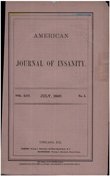Resistance to antidepressant medications and short-term clinical response to ECT
Abstract
OBJECTIVE: Traditionally, it has been widely assumed that the likelihood of response to ECT is independent of the adequacy of previous treatment with antidepressant medications. However, recent research has raised the possibility that medication-resistant patients with depression have a poorer clinical ECT outcome than patients who have not failed previous adequate medication trials. METHOD: Medication resistance of 100 patients with primary, unipolar, nonpsychotic major depression was evaluated during the index episode with the Antidepressant Treatment History Form. Patients were recruited and treated with ECT at three sites; standardized ECT and clinical assessment procedures were used. Clinical outcome was assessed immediately and 1 week after completion of the ECT course. RESULTS: Patients who previously had failed one or more adequate antidepressant medication trials were less likely to respond to subsequent ECT than patients not known to be medication resistant. This finding held within each study site, whether clinical response was assessed categorically or in terms of the magnitude of symptomatic improvement and after the authors accounted for other potential predictors of clinical outcome. Resistance to heterocyclic antidepressants predicted poorer outcome after ECT, while resistance to selective serotonin reuptake inhibitors and monoamine oxidase inhibitors did not show significant predictive relations. CONCLUSIONS: While a substantial percentage of medication- resistant patients respond to ECT, clinical outcome in this group is inferior to that of patients without established medication resistance. The predictive power of medication resistance is generalizable across diverse clinical settings, particularly for heterocyclic antidepressants, which perhaps suggests an overlap in the mechanisms of actions of ECT and this medication class.
Access content
To read the fulltext, please use one of the options below to sign in or purchase access.- Personal login
- Institutional Login
- Sign in via OpenAthens
- Register for access
-
Please login/register if you wish to pair your device and check access availability.
Not a subscriber?
PsychiatryOnline subscription options offer access to the DSM-5 library, books, journals, CME, and patient resources. This all-in-one virtual library provides psychiatrists and mental health professionals with key resources for diagnosis, treatment, research, and professional development.
Need more help? PsychiatryOnline Customer Service may be reached by emailing [email protected] or by calling 800-368-5777 (in the U.S.) or 703-907-7322 (outside the U.S.).



